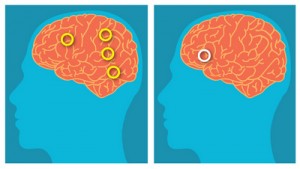Study: Dyslexia not related to intelligence. Implications for discrepancy model?
NIH-funded study finds dyslexia not tied to IQ (NIH press release):

At left, brain areas active in typically developing readers engaged in a rhyming task. Shown at right is the brain area activated in poor readers involved in the same task.
- “Regardless of high or low overall scores on an IQ test, children with dyslexia show similar patterns of brain activity, according to researchers supported by the National Institutes of Health. The results call into question the discrepancy model — the practice of classifying a child as dyslexic on the basis of a lag between reading ability and overall IQ scores.”
- “In many school systems, the discrepancy model is the criterion for determining whether a child will be provided with specialized reading instruction. With the discrepancy model, children with dyslexia and lower-than-average IQ scores may not be classified as learning disabled and so may not be eligible for special educational services to help them learn to read.”
Study Abstract
Although the role of IQ in developmental dyslexia remains ambiguous, the dominant clinical and research approaches rely on a definition of dyslexia that requires reading skill to be significantly below the level expected given an individual’s IQ. In the study reported here, we used functional MRI (fMRI) to examine whether differences in brain activation during phonological processing that are characteristic of dyslexia were similar or dissimilar in children with poor reading ability who had high IQ scores (discrepant readers) and in children with poor reading ability who had low IQ scores (nondiscrepant readers). In two independent samples including a total of 131 children, using univariate and multivariate pattern analyses, we found that discrepant and nondiscrepant poor readers exhibited similar patterns of reduced activation in brain areas such as left parietotemporal and occipitotemporal regions. These results converge with behavioral evidence indicating that, regardless of IQ, poor readers have similar kinds of reading difficulties in relation to phonological processing. Keywords: academic achievement, aptitude measures, dyslexia, neuroimaging, reading.
–> To access study: click Here.
Related articles:


